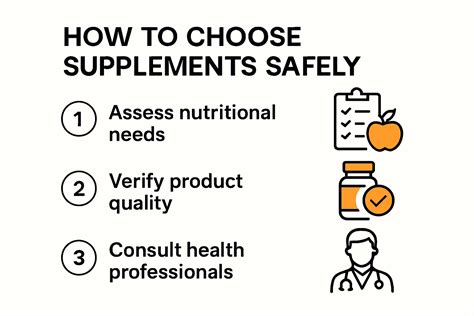How to Use Supplements Safely for Optimal Health

In today’s fast-paced world, many people turn to dietary supplements to support their health and enhance overall well-being. From vitamins and minerals to protein powders and herbal extracts, supplements are widely available and marketed as a way to boost energy, improve immunity, support weight loss, and even enhance athletic performance. However, the use of supplements must be approached with caution to ensure that they are safe, effective, and do not interfere with other health factors. Here’s a guide to help you use supplements safely and make the most out of them for optimal health.
Consult with Your Healthcare Provider
Before adding any supplement to your routine, it is crucial to consult with your healthcare provider, particularly if you have pre-existing health conditions, are pregnant or breastfeeding, or are taking prescription medications. Some supplements may interact with medications or exacerbate certain health conditions. A healthcare professional can help you determine if a supplement is appropriate for your needs and guide you on the proper dosage.
Understand Your Health Needs
Supplements are meant to complement your diet, not replace it. It’s important to first assess your current health status and nutritional needs. A balanced diet rich in whole foods such as fruits, vegetables, lean proteins, healthy fats, and whole grains should provide most of the nutrients your body needs. However, supplements can help fill in the gaps if you are deficient in certain vitamins or minerals, or if you have specific health goals that cannot be met through food alone.
For example:
- Vitamin D: People living in areas with limited sunlight may need supplementation to maintain adequate vitamin D levels.
- Omega-3 fatty acids: Those who don’t consume enough fatty fish may benefit from a fish oil supplement.
- Probiotics: If you have digestive issues or are recovering from antibiotics, probiotics may support gut health.
Choose Quality Supplements
Not all supplements are created equal, and the supplement industry is not as tightly regulated as pharmaceuticals. To ensure that you are getting a high-quality product, look for supplements that have been tested by third-party organizations such as the United States Pharmacopeia (USP), NSF International, or ConsumerLab. These organizations perform independent testing to verify the quality, potency, and purity of supplements.
Additionally, be cautious of products that make exaggerated claims or promises. If a supplement seems too good to be true, it likely is. Supplements should be used to support a healthy lifestyle, not as a quick fix or miracle cure.
Follow Recommended Dosages
It’s important to follow the recommended dosage for each supplement you take. More is not always better when it comes to supplementation, and excessive intake of certain vitamins or minerals can lead to toxicity and serious health issues. For example:
- Vitamin A: High doses can lead to liver damage and birth defects.
- Iron: Excessive iron intake can cause digestive issues and organ damage.
- Calcium: Taking too much calcium can increase the risk of kidney stones and interfere with the absorption of other minerals like magnesium.
To avoid potential toxicity, always stick to the dosage instructions provided on the supplement label or as advised by your healthcare provider.
Consider Timing and Absorption
The timing and absorption of certain supplements can impact their effectiveness. Some supplements are best taken with food to improve absorption, while others are better absorbed on an empty stomach. For example:
- Fat-soluble vitamins (A, D, E, K) are better absorbed when taken with a meal containing fat.
- Water-soluble vitamins (C and B-vitamins) are typically absorbed on an empty stomach, although they can be taken with food to avoid stomach upset.
If you are taking multiple supplements, it's also important to consider how they interact with each other. For example, calcium and magnesium should ideally be taken at different times, as they can compete for absorption. Similarly, taking high doses of zinc can interfere with copper absorption.
Be Aware of Potential Side Effects
While supplements are generally considered safe when used correctly, they can still cause side effects in some people. Common side effects might include digestive upset, headaches, or allergic reactions. If you experience any adverse effects, discontinue use and consult with your healthcare provider. Additionally, keep in mind that certain populations, such as children, the elderly, or people with compromised immune systems, may be more sensitive to supplements.
Some supplements, particularly herbal products, can have powerful effects on the body and may interact with prescription medications. For example, St. John's Wort, a popular herbal supplement used for mood enhancement, can interfere with the effectiveness of birth control pills, antidepressants, and blood thinners. Always inform your doctor of any supplements you are taking.
Monitor Progress and Adjust as Needed
Once you begin using supplements, it’s important to monitor your progress over time. Keep track of any changes in your health, energy levels, or well-being. If you’re not seeing the desired results, or if you experience any side effects, consider adjusting your regimen. Supplements are not a one-size-fits-all solution, and it may take some trial and error to find the right combination and dosage for your body.
Remember that supplements are most effective when combined with a healthy lifestyle, which includes a balanced diet, regular exercise, adequate sleep, and stress management. Supplements alone will not make up for poor habits or an unhealthy lifestyle.
Know When to Stop
If you’re using a supplement for a specific purpose (e.g., to correct a nutrient deficiency), make sure to reassess after a few months. Once you’ve addressed the deficiency or achieved your health goal, you may no longer need to continue taking that supplement. Overuse of supplements can lead to imbalances or toxicity, so it’s important to evaluate your ongoing need for each one.